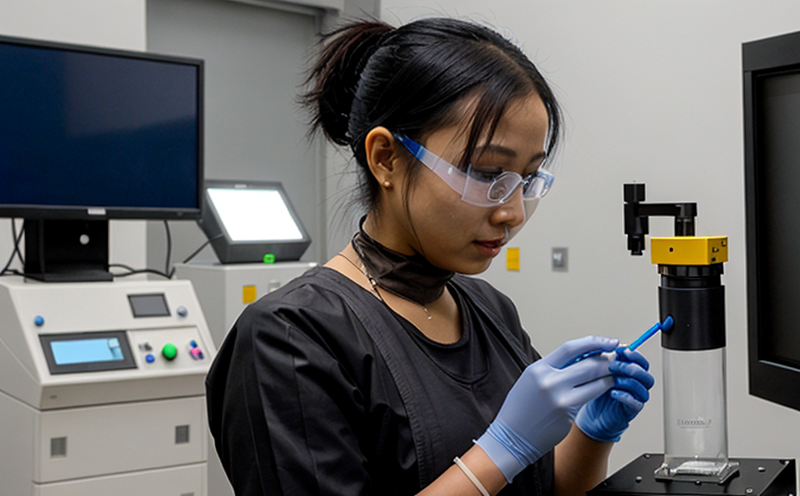ISO 19008 Analysis of Nanoparticles in Recycled Plastic Waste Streams
The ISO 19008 standard provides a comprehensive framework for the analysis and quantification of nanoparticles within recycled plastic waste streams. This service is crucial for ensuring that nanomaterials are appropriately managed, both from an environmental and health perspective. The presence of nanoparticles in these waste streams can have significant implications on recycling processes, product quality, and final consumer safety.
The process begins with the collection and preparation of representative samples from recycled plastic waste streams. These samples must be carefully handled to avoid contamination or degradation of nanoparticles that could compromise results. Once prepared, the samples undergo a series of analytical steps including size distribution analysis, elemental composition determination, and structural characterization using advanced instrumentation such as transmission electron microscopy (TEM), scanning electron microscopy (SEM), and X-ray diffraction (XRD).
The ISO 19008 standard ensures that these analyses are conducted with precision and reliability. It specifies the use of standardized methods to ensure consistent results across different laboratories, which is critical for accurate assessment and effective management of nanomaterials in recycled plastics.
Understanding the behavior of nanoparticles within recycled plastic waste streams is essential for optimizing recycling processes and ensuring product safety. By identifying the types and concentrations of nanoparticles present, manufacturers can make informed decisions about their use in products. This knowledge also aids in assessing potential risks associated with these materials and implementing appropriate mitigation strategies.
The ISO 19008 standard plays a vital role in promoting sustainable practices by providing a robust framework for nanomaterial analysis. It helps ensure that recycled plastic waste streams are managed responsibly, supporting environmental protection and public health. This service is particularly valuable for companies engaged in the production of consumer goods made from recycled plastics, as it provides critical insights into product safety and compliance with relevant regulations.
Through meticulous sampling, preparation, and analysis, this service offers a reliable means to monitor nanomaterials within recycled plastic waste streams. By adhering strictly to ISO 19008 guidelines, laboratories can ensure that their findings are accurate, reproducible, and valuable for decision-making processes in various sectors.
Why It Matters
The presence of nanoparticles in recycled plastic waste streams poses significant challenges for environmental protection and public health. These nanomaterials can persist in the environment longer than larger particles due to their small size, making them more susceptible to bioaccumulation and subsequent transfer up the food chain. Understanding the composition and distribution of these nanoparticles within recycled plastics is crucial for effective management.
By providing accurate data on nanoparticle concentrations and types, this service enables companies to make informed decisions about product design and manufacturing processes. It also supports regulatory compliance and helps mitigate potential risks associated with the use of nanomaterials in consumer products.
The ISO 19008 standard ensures that these analyses are conducted consistently across different laboratories, which is essential for maintaining accuracy and reliability in results. This consistency is particularly important given the complexity and variability inherent in recycled plastic waste streams, where nanoparticles may be present at varying levels depending on factors such as source materials and processing methods.
The insights gained from this analysis can inform strategies aimed at reducing environmental impacts while enhancing product quality. For instance, manufacturers can use this information to optimize recycling processes, develop safer products, or implement alternative materials that do not contain harmful nanomaterials.
Benefits
- Accurate and consistent data on nanoparticle concentrations and types within recycled plastic waste streams
- Support for regulatory compliance and environmental protection initiatives
- Informed decision-making regarding product design, manufacturing processes, and material selection
- Promotion of sustainable practices through responsible management of nanomaterials in recycled plastics
- Reduction of potential risks associated with the use of nanomaterials in consumer products
- Enhanced reputation and trust among stakeholders by demonstrating commitment to safety and environmental responsibility
- Access to state-of-the-art analytical techniques for precise nanoparticle characterization
This service not only aids individual companies but also contributes to broader efforts aimed at improving the sustainability of plastic recycling practices. By providing reliable data on nanomaterials within recycled plastics, this service helps drive innovation and responsible use of these materials.
Industry Applications
| Industry | Application |
|---|---|
| Retail | Analysis of nanoparticle concentrations in plastic packaging to ensure compliance with health and safety regulations. |
| Bioengineering | Evaluation of nanomaterials used in medical devices made from recycled plastics for biocompatibility testing. |
| Aerospace | Detection of nanoparticles within composite materials to assess their impact on aircraft performance and safety. |
| Consumer Goods | Monitoring nanoparticle levels in products made from recycled plastic to ensure product quality and safety. |
The ISO 19008 standard is applicable across various industries, particularly those involved in the production of consumer goods, medical devices, and composite materials. By providing accurate data on nanoparticle concentrations and types within recycled plastics, this service supports these industries in meeting regulatory requirements and enhancing product safety.





